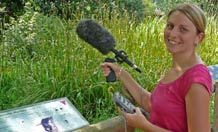
Alumna Dr Holly Farmer (Animal Behaviour 2003) at Paignton Zoo.
Zoo research comes over loud and clear
An Exeter alumna has found that, for one species of primate at least, it’s survival of the loudest.
Research carried out for the University and Whitley Wildlife Conservation Trust has shown that the howler monkeys who call most often, breed more. The discovery could help zoos improve the way they care for the species.
Alumna Dr Holly Farmer (Animal Behaviour 2003) is the Assistant Research Officer at the Trust, which runs Paignton Zoo, Living Coasts in Torquay and Newquay Zoo in Cornwall.
Holly outlines her findings in a paper to be published in Applied Animal Behaviour Science: “We have found that females who hear males calling breed more and that males who howl more breed more. In zoos, the more often adult males howl, the more likely they are to breed.”
The howler monkey Alouatta caraya is the loudest animal in the Americas. The long call of the male has been recorded at 90 decibels and heard over two kilometres (more than one mile) away.
Holly, who has just been awarded her Psychology PhD, has spent time in Argentina studying the species. Until now, breeding in zoos has been poor – but Holly’s research could help to change that.
“In the wild, females are attracted to dominant males who lead the howling,” she added. “Males who howl more have an increased chance of reproductive success – we think that a similar thing is happening in zoos. Howling may display the fitness of males and maintain social relations.
This information could help improve husbandry in zoos. Holly: “We know that there is a positive relationship between howling and reproductive success, so encouraging individuals to call more could be a way of increasing breeding. We could consider introducing other groups into a zoo or play back the sound of animals calling to mimic the presence of others nearby.
“Howling is the behaviour which characterises this genus, and may be a good indicator of welfare, with animals living under optimal conditions both howling and breeding more.”
Date: 2 December 2011
